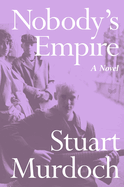
Stuart Murdoch, front man and principal songwriter for the Scottish indie-pop band Belle and Sebastian, was diagnosed with chronic fatigue syndrome before he made his creative mark in the mid-1990s; he sings about his struggle in "Nobody's Empire." In his identically titled autobiographical debut novel, Murdoch addresses the same subject, writing with endearing bemusement, charming self-deprecation, and winning petulance.
Nobody's Empire begins in Glasgow in 1991, with 20-something narrator Stephen Rutherford on disability and trying to get out from under his semi-incapacitating illness, which at its meanest required hospitalization. Stephen explores treatment options, dabbles in songwriting ("In the absence of anything else, maybe I can do this"), becomes an episodic churchgoer, tries fruitlessly to get warm, and sells his record collection to finance three restorative months in sunny California. In this new world, Stephen plays his first gig and enjoys an "international tryst." Then it's back to Glasgow for more of the same... but different, too.
The novel's chatty, confiding style accommodates a parade of wry turns of phrase (Stephen's old school chum was "as open as I was to the everyday harassment of being a non-fighting male"). Murdoch plants some Easter eggs for Belle and Sebastian fans, but Nobody's Empire can speak to anyone drawn to slay-the-dragon chronicles. Stephen's song and book recommendations amount to sterling play- and reading lists, and they set up readers to embrace what is apparently Murdoch's philosophy, captured in his fictional counterpart's remark, "I love [P.G.] Wodehouse. You see, as long as there's things to love we'll be ok." --Nell Beram, author and freelance writer

